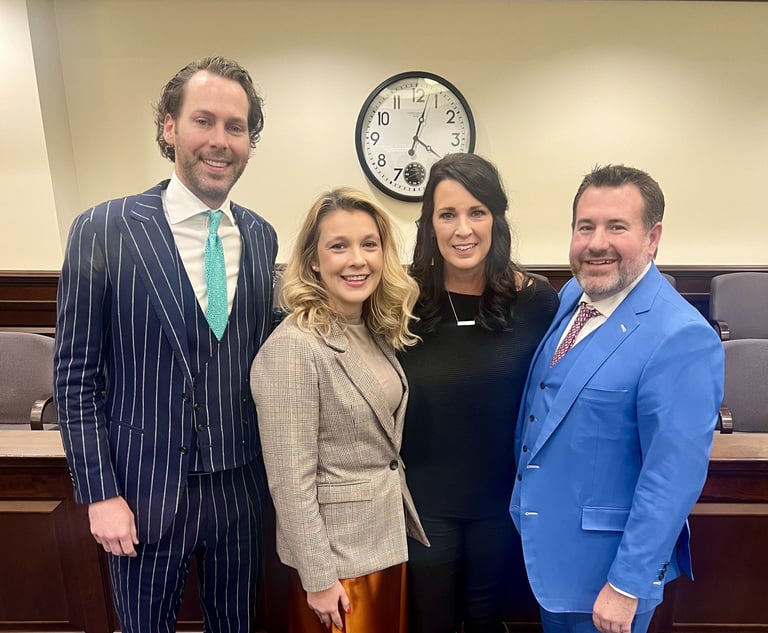Pa. Court Rules 'Gallagher' Should Be Applied Retroactively
In a class action against an insurance carrier, a Pennsylvania trial court has ruled that the Pennsylvania Supreme Court's decision in Gallagher v. Geico Indemnity should be applied retroactively.
September 26, 2019 at 10:00 AM
4 minute read
The original version of this story was published on Law.com
 Photo: Shutterstock
Photo: Shutterstock
This story is reprinted with permission from the Insurance Coverage Law Center, the industry's only comprehensive digital resource designed for insurance coverage law professionals. Visit the website to subscribe.
In a class action against an insurance carrier, a Pennsylvania trial court has ruled that the Pennsylvania Supreme Court's decision in Gallagher v. Geico Indemnity, holding that household exclusions in automobile insurance policies cannot be enforced, should be applied retroactively.
The Case
Keith Rutt alleged that, on Aug. 20, 2016, while he was riding his motorcycle (which was insured under an insurance policy issued to him by the Agency Insurance Co. of Maryland), he was injured in a motor vehicle accident due to the negligence of the driver of the other vehicle involved, which was insured under an insurance policy issued by State Farm Mutual Automobile Insurance Co.
According to Rutt, his claims for his injuries exceeded the combined limits of both the liability coverage under the State Farm policy and the underinsured motorist (UIM) coverage under the Agency Insurance policy. Rutt said that he received the policy limits of $50,000 under the State Farm policy, and was litigating his UIM claim under the Agency policy.
Rutt made a claim on Donegal Mutual Insurance Co., which had issued an insurance policy to Rutt on two cars, seeking recovery of UIM benefits under that policy. Donegal denied Rutt's claim on the basis of the household exclusion in its policy, which excluded UIM coverage for bodily injury sustained while occupying or when struck by "any motor vehicle you own or lease which is not insured for this coverage under this policy."
On Jan. 19, 2019, the Pennsylvania Supreme Court issued its decision in Gallagher, holding that household exclusions cannot be enforced as they "act[] as a de facto waiver of stacked UIM coverage provided for in the [Pennsylvania Motor Vehicle Financial Responsibility Law ('MVFRL')]."
Rutt filed a class action complaint against Donegal on March 19, seeking declaratory judgment and asserting a breach of contract claim against Donegal.
Donegal filed a preliminary objection in the nature of a demurrer on April 15, arguing that Gallagher should not be applied retroactively in this case. It maintained that Gallagher was distinguishable as the two policies at issue in Gallagher were both issued by the same insurance provider whereas Rutt's motorcycle was insured under the Agency Insurance policy and his cars were insured under the Donegal policy.
The Court's Decision
The Lancaster County Court of Common Pleas denied Donegal's objection, holding that Gallagher applied retroactively.
In its decision, the court first rejected Donegal's attempt to distinguish Gallagher, reasoning that Gallagher specified that all household vehicle exclusions violated the MVFRL, rather than limiting its holding to cases where both policies were issued by the same insurance provider.
The court then rejected Donegal's contention that even if Gallagher applied to these facts, it should not be applied retroactively because it introduced a new rule of law by breaking from precedent. The court pointed out that the U.S. District Court for the Eastern District of Pennsylvania concluded that Pennsylvania law required that Gallagher should be applied retroactively as it did not introduce a new rule of law or overrule prior binding precedent, in Butta v. Geico Casualty (noting that there had been no prior Pennsylvania Supreme Court majority holding addressing whether household vehicle exclusions violated Section 1738 of the MVFRL). The court said that it was persuaded by the reasoning of the district court in Butta.
The court also noted that on Sept. 4, the Pennsylvania Supreme Court vacated the trial court's order in Petra v. Pennsylvania National Mutual Casualty Insurance and remanded for reconsideration in light of Gallagher.
Therefore, the court concluded, given that the Supreme Court directed the trial court to consider Gallagher on remand of Petra, Gallagher also had to be applied retroactively in Rutt's class action.
The case is Rutt v. Donegal Mutual Insurance.
Steven A. Meyerowitz, a Harvard Law School graduate, is the founder and president of Meyerowitz Communications Inc., a law firm marketing communications consulting company. Meyerowitz is the director of the Insurance Coverage Law Center and editor-in-chief of journals on insurance law, banking law, bankruptcy law, energy law, government contracting law, and privacy and cybersecurity law, among other subjects. He can be contacted at [email protected].
This content has been archived. It is available through our partners, LexisNexis® and Bloomberg Law.
To view this content, please continue to their sites.
Not a Lexis Subscriber?
Subscribe Now
Not a Bloomberg Law Subscriber?
Subscribe Now
NOT FOR REPRINT
© 2025 ALM Global, LLC, All Rights Reserved. Request academic re-use from www.copyright.com. All other uses, submit a request to [email protected]. For more information visit Asset & Logo Licensing.
You Might Like
View All
Harrisburg Jury Hands Up $1.5M Verdict to Teen Struck by Underinsured Driver
3 minute read
Philadelphia Eagles 0-2 in Attempts to Recover Insurance on COVID-Related Losses
4 minute read
High Verdicts and Venue Rule Land Pa. Courts on Top of 'Judicial Hellhole' List
5 minute read
Trending Stories
- 1Trump Taps McKinsey CLO Pierre Gentin for Commerce Department GC
- 2Critical Mass With Law.com's Amanda Bronstad: 700+ Residents Near Ohio Derailment File New Suit, Is the FAA to Blame For Last Month's Air Disasters?
- 3Law Journal Column on Marital Residence Sales in Pending Divorces Puts 'Misplaced' Reliance on Two Cases
- 4A Message to the Community: Meeting the Moment in 2025
- 5Ex-Prosecutor Denies on Witness Stand That She Tried to Protect Ahmaud Arbery's Killers
Who Got The Work
J. Brugh Lower of Gibbons has entered an appearance for industrial equipment supplier Devco Corporation in a pending trademark infringement lawsuit. The suit, accusing the defendant of selling knock-off Graco products, was filed Dec. 18 in New Jersey District Court by Rivkin Radler on behalf of Graco Inc. and Graco Minnesota. The case, assigned to U.S. District Judge Zahid N. Quraishi, is 3:24-cv-11294, Graco Inc. et al v. Devco Corporation.
Who Got The Work
Rebecca Maller-Stein and Kent A. Yalowitz of Arnold & Porter Kaye Scholer have entered their appearances for Hanaco Venture Capital and its executives, Lior Prosor and David Frankel, in a pending securities lawsuit. The action, filed on Dec. 24 in New York Southern District Court by Zell, Aron & Co. on behalf of Goldeneye Advisors, accuses the defendants of negligently and fraudulently managing the plaintiff's $1 million investment. The case, assigned to U.S. District Judge Vernon S. Broderick, is 1:24-cv-09918, Goldeneye Advisors, LLC v. Hanaco Venture Capital, Ltd. et al.
Who Got The Work
Attorneys from A&O Shearman has stepped in as defense counsel for Toronto-Dominion Bank and other defendants in a pending securities class action. The suit, filed Dec. 11 in New York Southern District Court by Bleichmar Fonti & Auld, accuses the defendants of concealing the bank's 'pervasive' deficiencies in regards to its compliance with the Bank Secrecy Act and the quality of its anti-money laundering controls. The case, assigned to U.S. District Judge Arun Subramanian, is 1:24-cv-09445, Gonzalez v. The Toronto-Dominion Bank et al.
Who Got The Work
Crown Castle International, a Pennsylvania company providing shared communications infrastructure, has turned to Luke D. Wolf of Gordon Rees Scully Mansukhani to fend off a pending breach-of-contract lawsuit. The court action, filed Nov. 25 in Michigan Eastern District Court by Hooper Hathaway PC on behalf of The Town Residences LLC, accuses Crown Castle of failing to transfer approximately $30,000 in utility payments from T-Mobile in breach of a roof-top lease and assignment agreement. The case, assigned to U.S. District Judge Susan K. Declercq, is 2:24-cv-13131, The Town Residences LLC v. T-Mobile US, Inc. et al.
Who Got The Work
Wilfred P. Coronato and Daniel M. Schwartz of McCarter & English have stepped in as defense counsel to Electrolux Home Products Inc. in a pending product liability lawsuit. The court action, filed Nov. 26 in New York Eastern District Court by Poulos Lopiccolo PC and Nagel Rice LLP on behalf of David Stern, alleges that the defendant's refrigerators’ drawers and shelving repeatedly break and fall apart within months after purchase. The case, assigned to U.S. District Judge Joan M. Azrack, is 2:24-cv-08204, Stern v. Electrolux Home Products, Inc.
Featured Firms
Law Offices of Gary Martin Hays & Associates, P.C.
(470) 294-1674
Law Offices of Mark E. Salomone
(857) 444-6468
Smith & Hassler
(713) 739-1250





